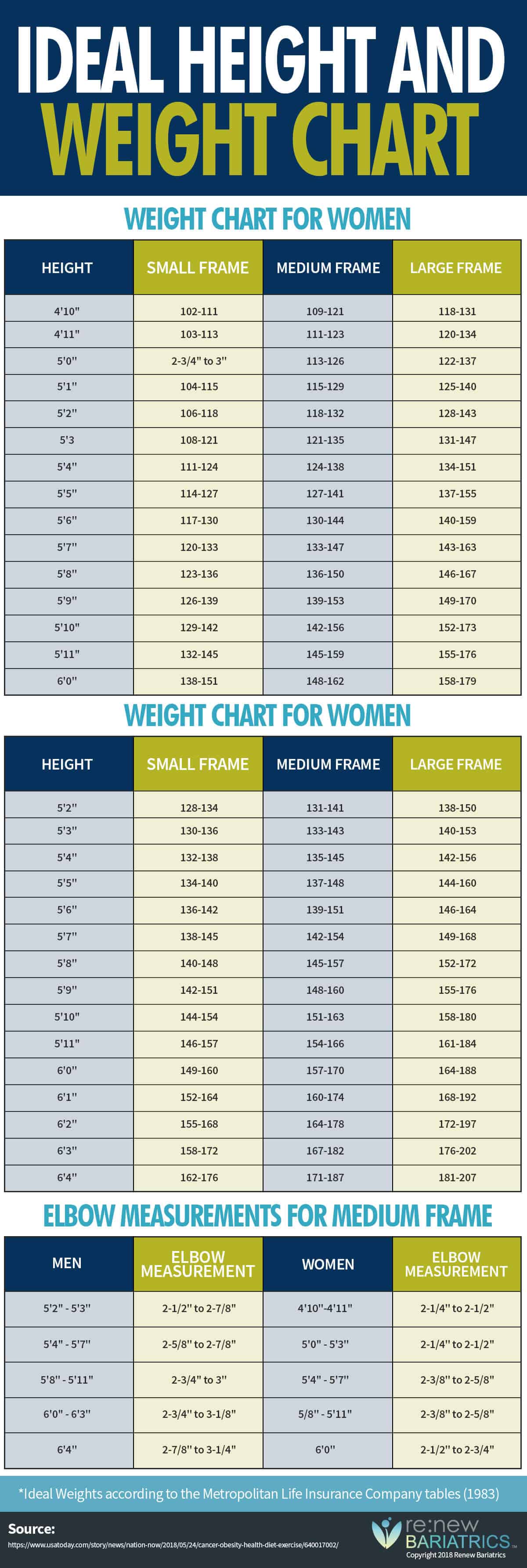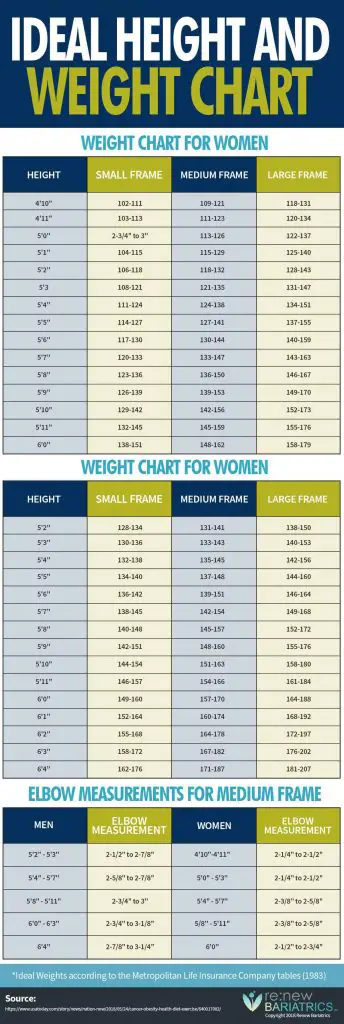Weight ranges are important for setting goals when it comes to health and fitness. A healthy weight range for adults is typically between 18.5 and 24.9 body mass index (BMI). BMI is a measure of body fat based on height and weight. If your BMI is below 18.5, you may be underweight. If your BMI is between 25 and 29.9, you may be considered overweight.
When your BMI is 30 or higher, you may be considered obese. It is important to consider other factors such as age, gender, and body type when determining an ideal weight range. Your doctor can help you to identify an appropriate weight range. It is important to work toward a healthy weight range, as being overweight or obese can increase your risk of many chronic diseases, such as heart disease and type 2 diabetes. Eating a balanced diet and exercising regularly can help you achieve and maintain a healthy weight range. If you are concerned about your weight, speak to your doctor or a trained health professional. They can help you create a plan to reach and maintain a healthy weight range.
what is the best weight

When it comes to weight, there is no one-size-fits-all solution. The best weight for any individual depends on a variety of factors, including age, sex, and body composition. Generally, the healthy range for weight is determined by a person’s body mass index (BMI). For adults, a BMI between 18.5 and 24.9 is considered in the healthy range, while a BMI below 18.5 is considered underweight, and a BMI above 24.9 is considered overweight. Of course, this range isn’t the same for everyone, as some individuals may be healthy at slightly lower or higher BMIs.
It’s important to note that BMI isn’t a perfect measure of health, as it doesn’t take into account muscle mass or body fat percentage. For people who are more muscular, they may have a higher BMI, but still be in the healthy range. A proper exercise program and healthy diet are also important components of maintaining a healthy weight. Exercise helps to build muscle, which can help to maintain a healthy weight and body composition. A balanced diet, focusing on nutrient-dense foods, is also essential for proper weight maintenance. Overall, the best weight for any individual is the weight at which they feel healthy and happy. Everyone has different needs and goals when it comes to their weight, so it’s important to take the time to assess your individual situation and find the healthy weight range that works for you.
What is the most successful diet to lose weight?
The most successful diet to lose weight depends on the weight range of an individual. Generally, if an individual is overweight, a simple reduction in caloric intake can help achieve a healthy weight. An individual should aim to reduce their calorie intake while maintaining an adequate intake of macro and micronutrients to ensure good health. For individuals who are obese, a more structured approach may be needed to help them lose weight. This could include a combination of a healthy diet and regular exercise.
This approach may help to reduce body fat stores and prevent any further weight gain. For individuals who are of a normal weight, following a balanced diet and exercising regularly can be an effective way to maintain a healthy weight. Eating a healthy diet, rich in fruits, vegetables and whole grains, as well as avoiding processed and sugary foods can help keep weight in the healthy range. In addition, engaging in regular physical activity can help to burn calories and reduce body fat. Exercise can also help to improve overall health and fitness. Overall, to achieve a healthy weight, it is important to eat a balanced diet and engage in regular physical activity. This can help to achieve weight loss in individuals of any weight range.
What are the top ten diets?
Weight ranges vary significantly from person to person, but that doesn’t mean that a diet that works for one person will work for another. Therefore, it can be difficult to determine which diet is best for someone. However, there are some popular diets that have been proven to be successful in helping people reach their desired weight range. The top ten diets are the Atkins Diet, The Zone Diet, The Ketogenic Diet, The Paleo Diet, The Mediterranean Diet, The Dukan Diet, The South Beach Diet, The Raw Food Diet, The Macro Diet, and The Volumetrics Diet. Atkins Diet is a low-carb diet that focuses on eating proteins and fats, while avoiding high-carb foods such as grains, fruits, and sugar.
The Zone Diet encourages balanced meals with a combination of carbs, proteins, and fats. The Ketogenic Diet is a high-fat, low-carb diet that helps promote weight loss by forcing the body to burn fats instead of carbohydrates. The Paleo Diet focuses on eating mainly plant-based foods, while avoiding processed and refined foods. The Mediterranean Diet focuses on eating fresh vegetables, fruits, legumes, grains, nuts, and healthy fats. The Dukan Diet is a high-protein diet that emphasizes eating lean proteins and avoiding carbs. The South Beach Diet encourages eating healthy carbs and lean proteins, while avoiding saturated fats. The Raw Food Diet focuses on eating raw, unprocessed food and avoiding processed and cooked food. The Macro Diet is a flexible diet that focuses on proper portions of proteins, carbs, and fats. Finally, The Volumetrics Diet encourages eating low-calorie, high-volume foods to help promote weight loss. Overall, these top ten diets are all effective options when trying to reach optimal weight ranges. However, it is important to consult a doctor or nutritionist before starting any of these diets.
What is the healthiest diet plan for weight loss?
The healthiest diet plan for weight loss depends on your weight range. If you are overweight, then a reduced-calorie diet with more vegetables, fruits, whole grains, and lean proteins is recommended. Eating smaller portions and cutting back on processed foods and sugary drinks can help to reduce your calorie intake. It is also important to incorporate regular physical activity into your schedule to ensure that you burn more calories than you consume. For those who are obese, a more extreme lifestyle change is necessary.
This might involve a combination of diet, exercise, and behavioral change. A dietician can help you to create a tailored plan that is tailored to your weight range. This might include higher-protein, lower-fat meals and snacks. A regular exercise routine should be established to help boost metabolism and support weight loss. For both overweight and obese individuals, it is important to make sure that their diet plans are balanced and contain all the necessary vitamins and minerals. Additionally, a diet that is rich in fruits, vegetables, lean proteins, and whole grains is important for a healthy weight loss plan. Keeping up with a balanced diet and regular exercise can help to maintain a healthy weight over time.
What are the best programs to lose weight fast?
Weight ranges can be an important factor when determining the best program to lose weight fast. If your goal is to drop a few pounds quickly, then fast weight loss diets are ideal for those with lower weight ranges. For those that have higher weight ranges, a more gradual approach with a combination of diet and exercise can be more effective. In either case, it’s important to look for weight loss plans that focus on healthy eating habits and offer a balance of exercise to accompany the diet. Eating foods that are low in calories while avoiding processed foods and added sugars can help you reach your goal.
Exercise can also be a huge part of any weight loss program. Regular physical activity combined with a healthy diet can help speed up the process in many cases. This can include cardio workouts, strength training, and even yoga or pilates. It’s also important to consider any health issues when deciding on the best program for weight loss. If you have diabetes, high blood pressure, or any other health condition, it’s important to consult with your doctor before beginning any new diet or exercise program. Overall, the best program to lose weight fast will depend on your weight range, health issues, and overall goal. With the right plan, you can achieve your goals in a healthy and safe way.







